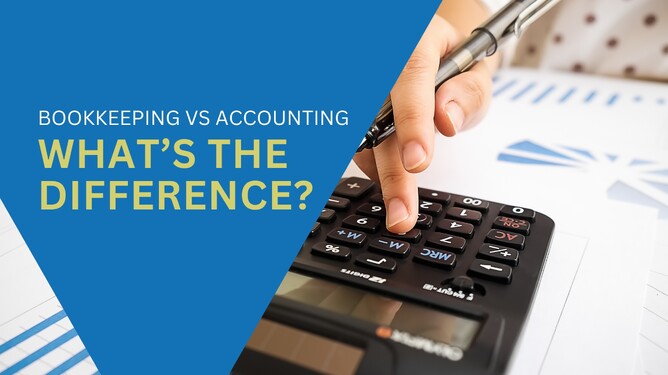Is accounting and bookkeeping the same thing? In the world of finance ‘accounting’ and ‘bookkeeping’ are often used interchangeably. But while there may be an overlap of tasks performed by bookkeepers and accountants, there are key differences in why you might hire a bookkeeper instead of an accountant. In this article, I’ll discuss the differences between accounting and bookkeeping, so, you can decide which service is right for your business.
What is Bookkeeping?
Typically, bookkeepers focus on recording transactions and maintaining an organisation's finances. This can include services like recording payments and transactions; processing staff payroll; customer invoicing and recording payments; conducting monthly bank reconciliations, preparing books and providing year-end financials and tax documents for the accountant.
Bookkeeping often involves maintaining the day-to-day transactions of a business, keeping accurate records of income and expenses, and ensuring financial data is up-to-date. Accurate bookkeeping is essential for a business because it ensures compliance with local tax regulations and provides valuable insight into a business’s financial health. By keeping track of cash flow, expenses, and revenue, bookkeeping helps businesses make informed decisions and identify areas for improvement.
The Role of Accounting
While bookkeeping focuses on the accurate recording of financial transactions, accounting takes a broader view, encompassing analysis, interpretation, and reporting of financial information. Accountants utilise the data compiled by bookkeepers to prepare financial statements, such as balance sheets, income and cash flow statements, which provide a comprehensive overview of a company's financial performance.
Accountants play a crucial role in ensuring your business complies with tax laws and regulatory requirements but also provide strategic financial advice. Accountants can perform business audits and analyse financial data to assess the profitability of a business, identify trends, and provide a future forecast, helping organisations make informed financial decisions to achieve their goals.
Which option is best for your business?
So, which option is best for your business? Well, ask yourself the following questions:
Are you a small-to-medium-sized business requiring help with your financial transactions?
Are you taking on new staff? Is your payroll becoming more complex?
Do you find managing your financial records time-consuming, and you’d like to free up more time to concentrate on the core needs of your business?
Are you having trouble keeping up with changes in GST and tax regulations?
Do you want to streamline your end-of-year financials?
Do you need help understanding and paying provisional tax?
A bookkeeper might be the right option for your business!
If your business is audited regularly or is experiencing rapid growth and requires a more advanced financial analysis, strategic planning, tax expertise, and regulatory compliance — you are likely a good fit for an accountant.
However, accountants and bookkeepers often work closely together, especially in larger organisations where financial responsibility is more complex. Bookkeepers prepare the groundwork, leaving the accountant to analyse the financial health of an organisation and provide strategic recommendations.
Five Reasons to Hire a Bookkeeper
If your business is too small to justify hiring an accountant, you’re struggling to keep on top of the paperwork, or you just want to know how your business is performing regularly, it might be time to consider hiring a bookkeeper. Here are five ways a bookkeeper can help you and your business.
#1. Accuracy and Compliance
Bookkeepers are trained to accurately record financial transactions and ensure compliance with relevant accounting standards and regulations. By hiring a bookkeeper, you can mitigate the risk of errors in your financial records and avoid potential penalties for non-compliance.
#2. Save Time
Managing financial records can be time-consuming, especially for business owners who already have numerous responsibilities. Hiring a bookkeeper allows you to delegate this task, freeing up valuable time to focus on core business activities or personal pursuits.
#3. Financial Insights
Bookkeepers provide valuable insights into the financial health of a business by generating reports and analysing financial data. By interpreting trends and identifying areas for improvement, a bookkeeper can help you make informed decisions about your business to optimise your operations and achieve your goals.
#4. Tax Preparation
Bookkeepers play a crucial role in preparing financial records for tax purposes, ensuring all your income, expenses, and deductions are accurately documented. This streamlines your tax filing process and minimises the risk of errors, potentially leading to tax savings or refunds.
#5. Scalability
As your business grows, so do your financial complexities. Hiring a bookkeeper can ensure that your financial records are properly managed and organised, laying the groundwork for future growth. A bookkeeper can adapt their services to accommodate the changing needs of your business, and provide ongoing support as it expands and evolves.
#6. Cost
Bookkeeper services often come at a lower cost compared to accountants because of the differences in the role, responsibilities, and qualifications. Bookkeepers primarily focus on financial tasks and details, whereas, accountants often undergo extensive education, therefore, may command higher fees. Businesses seeking basic financial management and record-keeping may find it more cost-effective to hire a bookkeeper.
Too small for a full-time accountant? Struggling to keep on top of your bookwork? Want to know how your business is performing regularly? Get in contact with me to discuss your tax and bookkeeping needs.


